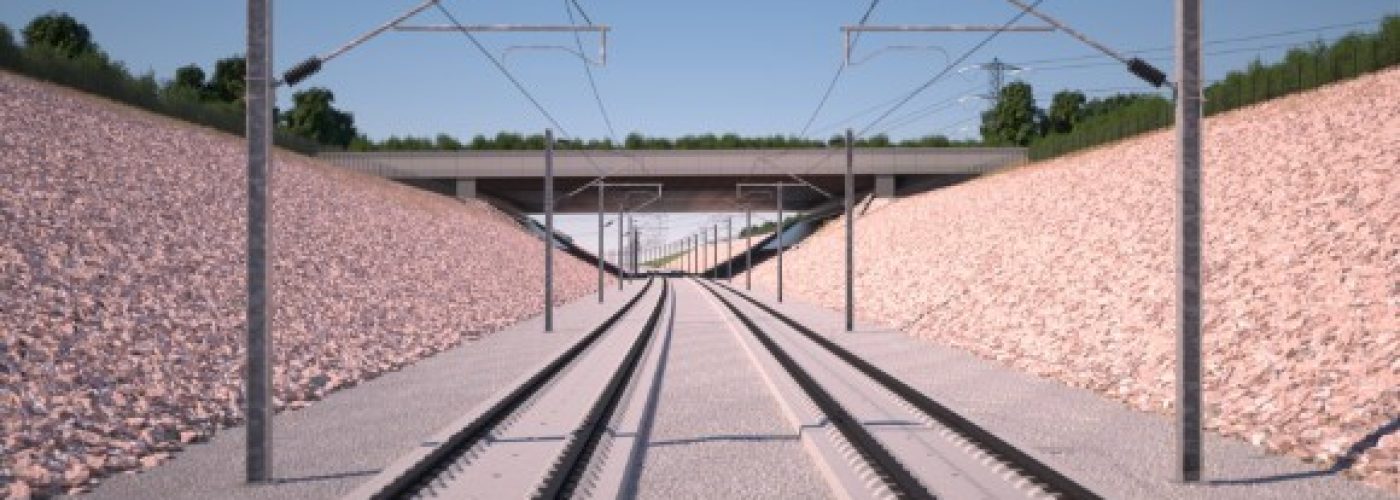HS2 yesterday revealed new images of the project’s largest ‘green bridge’, which will cross the high-speed railway near Brackley.
The 99m-wide bridge is designed to take a local road over the new railway close to the village of Turweston, which is on the outskirts of Brackley, with new hedgerows and vegetation planted on top to create a space for wildlife. It will also carry a footpath and bridleway.
An increasingly common sight above new railways and motorways on the continent, green bridges protect birds, mammals and insects while longer ‘green tunnels’ also help protect views across the countryside and reduce noise and disturbance for local communities.
Sixteen green bridges will be built as part of the HS2 project, with most carrying a combination of local roads, footpaths and farm access routes. Five green tunnels are also being built, with some up to one-and-a-half miles long.
Together they will help knit together 33 square kilometres of new wildlife habitats alongside the railway including 7 million new trees and shrubs.
Construction of the HS2 project, which will link London and Birmingham, is now well underway. Once complete, it will almost halve journey times between Britain’s two largest cities and free up space for more local trains on the most crowded parts of the existing west coast mainline.
The bridge will cross one of the railway’s longest and deepest cuttings, which will stretch for 1.5 miles past the village of Turweston on the edge of Buckinghamshire and West Northants.
Elizabeth Longinotti, HS2 Ltd’s Senior Project Manager, said:
“Green bridges are still rare in the UK and just one example of how HS2 is leading the way in terms of innovation and environmental protection. The bridge at Turweston will help keep communities connected, while supporting wildlife and biodiversity on either side of the railway.
“Once complete, HS2 will deliver faster, more reliable journeys between London and Birmingham – while freeing up space on the existing mainline for more local trains. But it’s also important that we deliver on our environmental commitments, which is why Turweston’s green bridge is so important.”
The bridge was designed by HS2’s main works contractor EKFB, a team made up of Eiffage, Kier, Ferrovial Construction and BAM Nuttall, working with its design partner, ASC (a joint venture between Arcadis Setec and COWI) and specialist architects Moxon.
Thirty-six steel beams will support the structure, with pre-cast concrete slabs forming the deck. 2,700cubic metres of earth will then be landscaped over the top, with the hedgerows, shrubs and other vegetation planted last.
During the design stage, better than expected ground conditions combined with design optimisation, allowed the team to cut the structure’s carbon footprint by 42%. This was achieved by significantly reducing the amount of carbon-intensive concrete and steel by removing 102 deep piles and opting for shallow foundations instead.
Excavation of the cutting is well underway, alongside foundation works for the bridge. Assembly of the steelwork is expected to begin later this year.
Tony Wehby, EKFB’s Project Director, said:
“The earthworks programme between Turweston and Greatworth includes some of the largest cuttings on the HS2 project. One of the deepest and largest in terms of volume is the cutting at Turweston.
“To ensure connectivity isn’t lost for our local communities and the areas ecology, this well-thought-out overbridge is designed to connect both sides of the cutting and is still in keeping with its environment – boasting a landscaped area to blend into its surroundings.“The team has also done a tremendous job in finding innovative ways to reduce the carbon output of this structure; through our value-added engineering practice, we have reduced the number of piles required by adopting shallower foundations. This has benefitted the delivery programme and reduced costs – we’re really pleased with this outcome. We look forward to seeing the structure come to life when its steel beams arrive in the summer for the next phase of construction.”
Building, Design & Construction Magazine | The Choice of Industry Professionals





